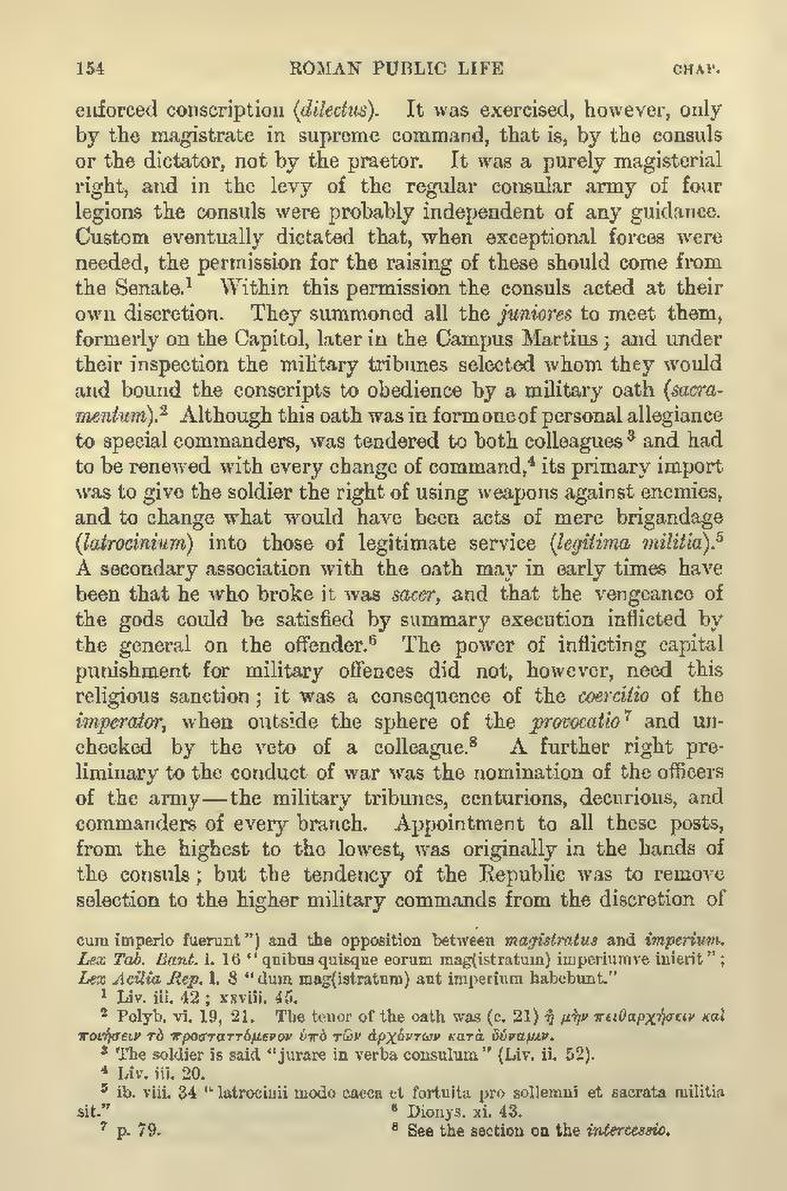enforced conscription (dilectus). It was exercised, however, only by the magistrate in supreme command, that is, by the consuls or the dictator, not by the praetor. It was a purely magisterial right, and in the levy of the regular consular army of four legions the consuls were probably independent of any guidance. Custom eventually dictated that, when exceptional forces were needed, the permission for the raising of these should come from the Senate.[1] Within this permission the consuls acted at their own discretion. They summoned all the juniores to meet them, formerly on the Capitol, later in the Campus Martius; and under their inspection the military tribunes selected whom they would and bound the conscripts to obedience by a military oath (sacramentum).[2] Although this oath was in form one of personal allegiance to special commanders, was tendered to both colleagues[3] and had to be renewed with every change of command,[4] its primary import was to give the soldier the right of using weapons against enemies, and to change what would have been acts of mere brigandage (latrocinium) into those of legitimate service (legitima militia).[5] A secondary association with the oath may in early times have been that he who broke it was sacer, and that the vengeance of the gods could be satisfied by summary execution inflicted by the general on the offender.[6] The power of inflicting capital punishment for military offences did not, however, need this religious sanction; it was a consequence of the coercitio of the imperator, when outside the sphere of the provocatio[7] and unchecked by the veto of a colleague.[8] A further right preliminary to the conduct of war was the nomination of the officers of the army—the military tribunes, centurions, decurions, and commanders of every branch. Appointment to all these posts, from the highest to the lowest, was originally in the hands of the consuls; but the tendency of the Republic was to remove selection to the higher military commands from the discretion of
- [Footnote: cum imperio fuerunt") and the opposition between magistratus and imperium.
Lex Tab. Bant. 1. 16 "quibus quisque eorum mag(istratum) imperiumve inierit"; Lex Acilia Rep. 1. 8 "dum magi(stratum) aut imperium habebunt."]]
- ↑ Liv. iii. 42; xxviii. 45.
- ↑ Polyb. vi. 19, 21. The tenor of the oath was (c. 21) [Greek: hê mên peitharchêsein kai poiêsein to prostattomenon hypo tôn archontôn kata dynamin.
- ↑ The soldier is said "jurare in verba consilium" (Liv. ii. 52).
- ↑ Liv. iii. 20.
- ↑ ib. viii. 34 "latrocinii modo caeca et fortuita pro sollemni et sacrata militia sit."
- ↑ Dionys. xi. 43.
- ↑ p. 79.
- ↑ See the section on the intercessio.
